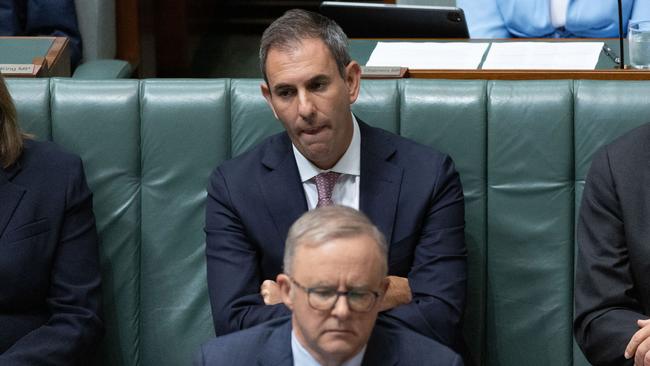
And the more likely the federal government is also going to start wearing the blame for it.
This is now the most serious political risk facing Anthony Albanese and Jim Chalmers, with rises in mortgage interest charges now the largest contributor to cost-of-living pressures for those who have one.
While most people accept the primacy of the bank’s independence, the more prescriptive it is on inflation, the more electorally culpable the government is in danger of becoming.
There is clearly a growing concern among some members of the government about the RBA’s aggressive posture, with every rate rise burning into the hip pocket of mortgage holders.
The cure, for many, is becoming more painful than the disease the RBA is trying to treat.
Hence the beginning of pushback against the central bank, which despite its even more hawkish language after Tuesday’s ninth consecutive rate is, by its own admission, operating in a sea of economic uncertainty.
Cabinet minister and former Labor leader Bill Shorten on Tuesday delivered another swipe at the bank, reflecting an instinctive response that a Labor government should be making it clear whose side it is on – the banks or the battlers.
His argument; inflation was a lag indicator, and rate rises a future measure, meaning people were being punished tomorrow for what had happened months ago.
“The point is, though, even though the bank is independent, I hope that they’re mindful of the effect that this has … I think inflation is coming down as it is,” Shorten said. “So the Reserve Bank, I hope, and some of the commentators who are urging them on to keep lifting the rates, they just need to take a deep breath.
“You don’t want to cause bigger problems to Australians who are paying mortgages when the inflation problem is beginning to recede anyway.”
Shorten’s view isn’t exceptional. That is, even some economists admit the RBA went too low, then too slow, and now it is overreacting.
John Howard was clear-eyed about the clash of retail politics and the RBA’s charter, when in 2006 he apologised for rising interest rates in the face of an inflationary problem.
“I certainly have today accepted, regrettable though it is, that there is a strong economic case for the interest rate rise,” the former Liberal prime minister said at the time.
“I don’t like it, I’m sorry about it.”
Last year, the Treasurer and Prime Minister tried to blame the Morrison government for the first rate rise, claiming it was a consequence of previous economic mismanagement.
As Howard said last year in response to the then opposition’s attempts to blame the then Coalition government for an interest rate rise, Labor can’t have it “three ways” when trying to conjure a credible political narrative.
It’s an argument that didn’t wash then, and considering the government has already handed down a budget and all the consecutive rate rises have been under its watch, it must find a way to inoculate itself from a turning of the tables.
Peter Dutton reckons the Albanese government is acutely vulnerable on cost-of-living pressures, which for mortgage holders have just become more acute.
With Albanese and Chalmers now hostage to every move the RBA makes, the May budget becomes even trickier.
Chalmers may rhetorically acknowledge the need to withdraw government from the economy, by keeping a lid on spending, but there are already cost-of-living packages promised that in themselves, according to some economists, will be inflationary.
Then there are the states’ contributions, particularly NSW, where the major parties gearing up for an election don’t appear to be bound by any belief that they need to show the same anti-inflationary fiscal restraint.
While Chalmers, as Treasurer, would feel the need to be cautious in his commentary on interest rate decisions, others in cabinet clearly feel less compelled to. And understandably.
And, while public confidence in the RBA must be upheld, and the government’s support for its independence is central to that, it doesn’t mean the human impact of its decisions shouldn’t be questioned.
The soundness of the RBA’s blunt-force determinations must also surely weigh heavily on the maintenance of public confidence.





The harder the central bank goes in its war on inflation, the greater the danger that it overshoots and damages the economy.